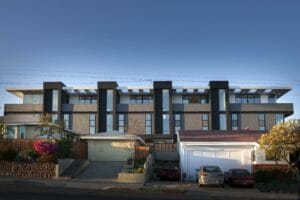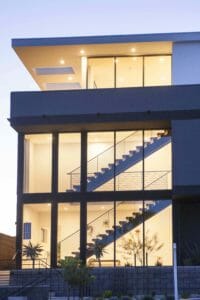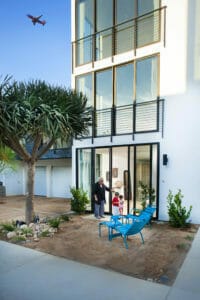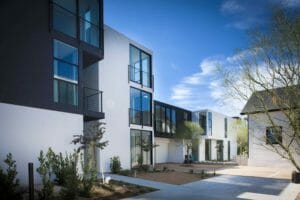Top Story
Name: Soheil Nakhshab
Company: Nakhshab Development & Design (NDD)
City: San Diego, California, with one project in Cape Town, South Africa
Product Types: multifamily residential
What did you do before you were a developer?
I started when I was about 17 years old. I always had a passion for building things. And art. I told my dad that I wanted to be an artist, but he told me to go into mathematics. I actually went to school for structural engineering. I already had an eye for design and wanted to pair that with a technical degree.
I started a consulting company first on structural engineering projects and, on occasion, architectural. I was also building single-family homes. My brother was involved. That led to a more diverse company where I shifted away from a consulting practice, and I shifted into architectural design and development of multifamily homes. There’s so much less brain damage in doing that as opposed to single-family. It’s a lot safer—a lot more secure—and we could bring the high-end work into multifamily as opposed to the vanilla product that’s all over the market.
What motivated you to make the leap into development?

Louis V. South Elevation, unlike your typical rowhome the main living area is located on the top floor with private patio separated by each units stair mass to maintain privacy.
It’s an organic thing. You want to create a lifestyle. You want to create a community. In order to be the composer of that, you have to be the developer. I was exposed to it at an early age. My father was a big developer in Iran. For me, I had already educated myself in the trade, and I had the natural eye. It was just a matter of bringing those elements together and figuring out how the finance and entitlement process worked.
In dealing with the day-to-day operation of your enterprise, what do you find to be most difficult to accomplish?
[Chuckles] That’s a big question. In the day-to-day, you get bogged down with the administrative work. I got into this because I wanted to change my city. But you have to deal with banks and deal with an accountant not giving you proper budgets. That’s just the name of the game as a small business owner.
Where do you turn to get a fresh perspective or experienced insight on a prospective or existing deal?

Louis V. East Elevation, transparency was added to this elevation to connect the property owners to the community, activating the street
My philosophy about that is that you never stop learning. The people you surround yourself with can be a great resource for learning. I tend to keep a younger group of energetic employees who wear multiple hats. They do ten different things, and I always push research and development to find new things to implement in our practice.
How has San Diego’s transient, young population in your expensive city influenced your work?
Given the fact that people aren’t able to afford homes in these nice neighborhoods, what I offer is a luxury option as rentals. So, if people want to be in a beautiful neighborhood, then they can do that without having to get a multimillion-dollar mortgage for a run-down house.
In a building, that can be done in a lot of places. It can come down to the bathrooms. I put in linear drains. I put in dual shower heads. These are very basic things you can do as a developer that add a bit of extras to the space.
What gets you out of bed every day to do what you do?
I’m an addict. [laughs] I do it because I love creating and accomplishing. When you’re young, you think some things are complicated. And when you’re old, what is “complicated” changes. As you grow, setting goals for yourself is important. I kind of blame my father for that. He never did pat me on my back. He’d always tell me that I could do better. So, when I wake up, I’m always looking to build our business so that I can pass it along to the next generation.
What does being a successful real estate developer mean to you?
Being a successful real estate developer means being able to sustain what you swallow. I don’t think it means developing hundreds of units or developing high-rises. If you can do a small boutique development and minimize your exposure, then that’s a key to success. Because how much do we even need to survive in this world? We live in a world where we’re told to get more, more, more. But if you can build a nice reputation and build what you need to support your lifestyle, then that’s all it comes down to.
In looking at the next one to two years, what do you see as the biggest challenges to your business and projects?
We’re trying to figure out whether we can finance projects on our own or have to bring in equity partners. Also, there’s a scarce pot of real estate right now. The market is heavily inflated right now, and the inventory sucks. For us, we try to be creative with what we go for. We typically go for very complex sites that no one else wants to deal with.
What skills or traits do you think are most important to make the leap into real estate development?

Sofia Lofts. Highlighting Aging in place, the ground floor unit accommodates aging in place for the baby boomer generation.
You have to have some sort of background in this industry. The people who are architects before making the leap know the entitlement process. They can build buildings without having to pay ridiculous fees to consultants. It could even be in finance, where you have a huge Rolodex of people willing to give you money for a deal. But if you screw up on someone else’s dollar, then you can’t get them back for future deals.
What skill or trait did you lack at one point, and how did you overcome it?
I didn’t have any knowledge on the finance side. I knew nothing about pro formas. I taught myself that stuff. For me it was getting into the industry, getting to know people, and learning how they did it. Hopefully you’ll cross paths with an older developer who’s willing to share his knowledge with you. Especially in a young city with potential, they know that if they help you succeed, then they know that your success will help them. Your good work will benefit their real estate.
What was a memorable mistake?
Sometimes when you dive into a project at a scale that you haven’t before, things can get out of control and impact you. In one of my projects, I underestimated some of the site utility work that needed to be done.
Since we do so much internally, we’ve ended up having third-party people peer-review our plans just to have a second set of eyes to make sure you’re not putting yourself in a bad situation. Even with pro formas, I’ll have fellow developers review it.
How do you balance designing for people versus designing for a buyer?

Sofia Lofts. Inner courtyard connecting all tenants. This courtyard is used for tenant activities, including outdoor theatre, bbq area, and firepit.
I design properties that I would personally want to live in. Then evaluate my social and demographic environment. Sometimes we’re like an advertising agency. Our expectations are looking at the future and about what we want to live. Then I marry that with a multigenerational mind-set, because I think it’s really important for us to grow
together. With the technology boom, people aren’t really interacting with each other. Finding love isn’t found by way of eyes passing on the street anymore. What I’m trying to do is build community again, and make people realize that they can interact with each other.
What’s your favorite city to visit and why?
I live in paradise for one thing, so every time I leave, I want to come back to it. But in the States, I like Chicago. It probably has some of the nicest architecture in the country. Palm Springs is so relaxing. I like being in places where there’s a beautiful natural or architectural environment around me.
About Entrepreneur Profiles
Entrepreneur Profiles are conversations with real estate development professionals who, in most cases, have recently made the leap into the industry whether as young individuals fresh out of school or as mid-career transitions.
With a focus on small-scale developers often doing incremental and transformative work, these are quick and easy to read profiles to raise awareness of these professionals. By telling their stories, the Urban Land Institute hopes to inspire the next generation of small scale entrepreneurs to transform their own communities. See the most recent Entrepreneur Profiles.